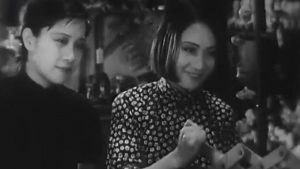The film:
The Unfinished Comedy
Meiyou wancheng de xiju 沒有完成的喜劇
Alternate Chinese title: Wei wancheng de xiju 未完成的喜劇
Directed by Lü Ban 呂班
Screenplay by Luo Tai 羅泰 and Lü Ban 呂班
Music composed and conducted by Ma Lin 馬琳
Studio: Changchun Film Studio 長春電影製片廠
Starring: Han Langen 韓蘭根, Yin Xiucen 殷秀岑, Fang Hua 方化, Su Manyi 蘇蔓意, Chen Zhong 陳衷, Ning Xiping 寧喜萍, Zhang Qinzhen 張勤箴, Bai Mei 白玫, Yan Huang 嚴皇, Wu Yumei 武豫梅, Ma Yuling 馬玉玲
89 minutes, sound
Year of production: 1957 (banned before release)
English subtitles translated by Christopher Rea
Subtitles created by Liu Yuqing
ABOUT THE FILM:
Bring back the clowns! In the plot of this metacinematic film, New China was founded several years ago, in 1949, and beloved Republican-era screen comedians skinny man Han Langen and fatty Yin Xiucen (playing themselves) are only just now getting the chance to make films again thanks to the invitation of Changchun Film Studio (playing itself). The Hundred Flowers Campaign is under way, a cultural thaw spurred by the apparent newfound openness of the Chinese Communist Party. Now that Han and Yin have, in their words, “returned to the ranks,” will the results of their filmmaking be “flowers of comedy” or just “a clump of weeds”…especially when their first three films are screened for the censor, Comrade Bludgeon?
The Unfinished Comedy is the most daring Chinese film comedy of the 1950s, one that takes direct aim at the myopia of present-day New China’s censors. The film was the third of a trio of short film comedies that actor-turned-director Lü Ban made during the brief liberalization of the Hundred Flowers Campaign (1956-57), following Before the New Bureau Chief Arrives 新局長到來之前 (1956) and Don’t Sweat the Small Stuff 不拘小節的人 (1956). Veteran actors Han and Yin are in fine fettle, and the film displays flashes of satirical brilliance, especially in the first film-within-a-film, which culminates with an old comedian’s cri de coeur: “I never died! I’m alive! I’m alive and well!”
The Unfinished Comedy’s dramatization of how the contemporary cultural politics of the People’s Republic of China was constraining film artists proved too objectionable to the real-life censors. The film was banned before its release, and Lü Ban became a target of political persecution during the Anti-Rightist Movement (1958). The film was belatedly released in the 1980s.
The first film-within-a-film is adapted from the Russian stage play “Resurrection/Sunday on Monday (Voskresenie v ponedel’nik),” by Vladimir Abramovich Dykhovichnyi (1911-1963) and Moris Romanovich Slobodskoi (1913-1991), which was translated into Chinese in 1955. The play was also adapted into the Russian-language film A Groom from the Other World (1958).
The Chinese Film Classics Project thanks Liu Yuqing for creating the subtitles and Katherine Bowers for sharing her research.
Learn more:
Watch Republican China’s most famous screen comedians have fun with a “ha-ha mirror”:
A screen comedian of yesteryear reminds us that he ain’t dead yet:
To learn more about the history of The Unfinished Comedy, see:
Ying Bao, “The Problematics of Comedy: New China Cinema and the Case of Lü Ban,” Modern Chinese Literature and Culture, vol. 20, no. 2 (Fall 2008): 185-228.
Chuanhuai Meng, “Lü Ban’s Comedies, Transnational Film Auteurism, and Comedic Modernism in Early Socialist China,” Modern Chinese Literature and Culture, vol. 36, no. 1 (June 2024): 116-150.
Christopher Rea and Henry Jenkins, “The Ancient Art of Falling Down: Vaudeville Cinema Between Hollywood and China” (2016):
Watch the film A Groom from the Other World (Leonid Gaidai, dir., 1958) (in Russian only).
Related Posts
Hua Mu Lan 木蘭從軍 (1939)
A young woman takes her father's place in the army and protects the Tang empire from invaders in this wartime adaptation of the Mulan legend.
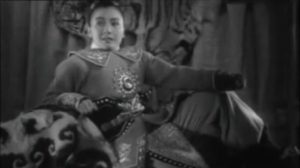
The Great Road 大路 (1934)
In this genre-bending romp, a band of road workers, aided by two women, build a great road to help China fight off invaders.
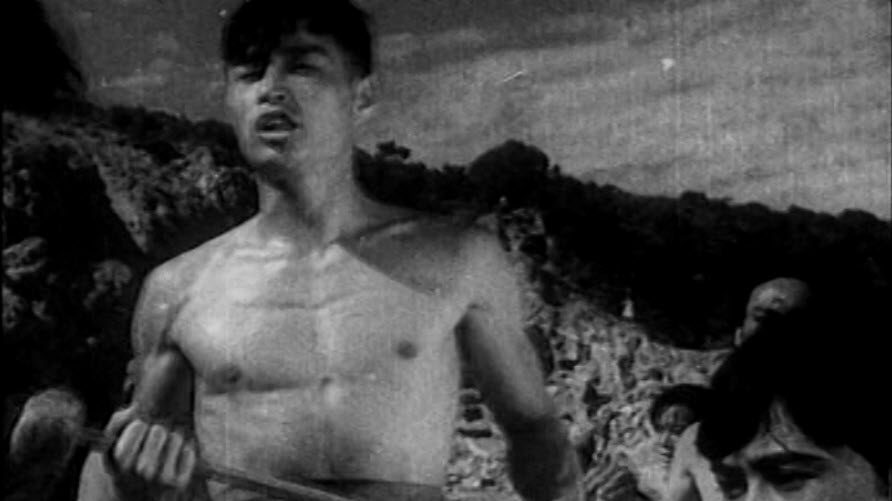
Song of the Fishermen 漁光曲 (1934)
Sister and brother struggle to survive as fishermen in northern China, in this musical melodrama. A box office smash.
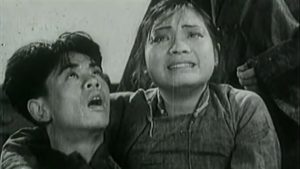
Sports Queen 體育皇后 (1934)
A country girl joins a women's sports academy in Shanghai and becomes a national track star. Will she learn the true athletic spirit?
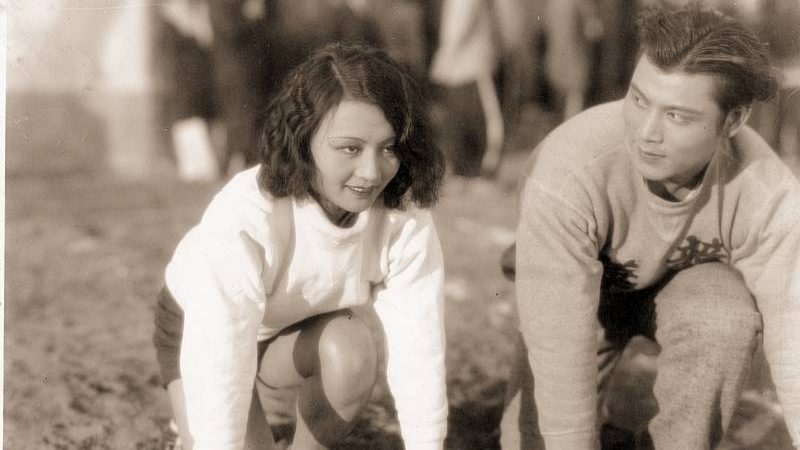
Playthings 小玩意 (1933)
Artisan toymakers struggling to survive amidst war and competition from big business.
